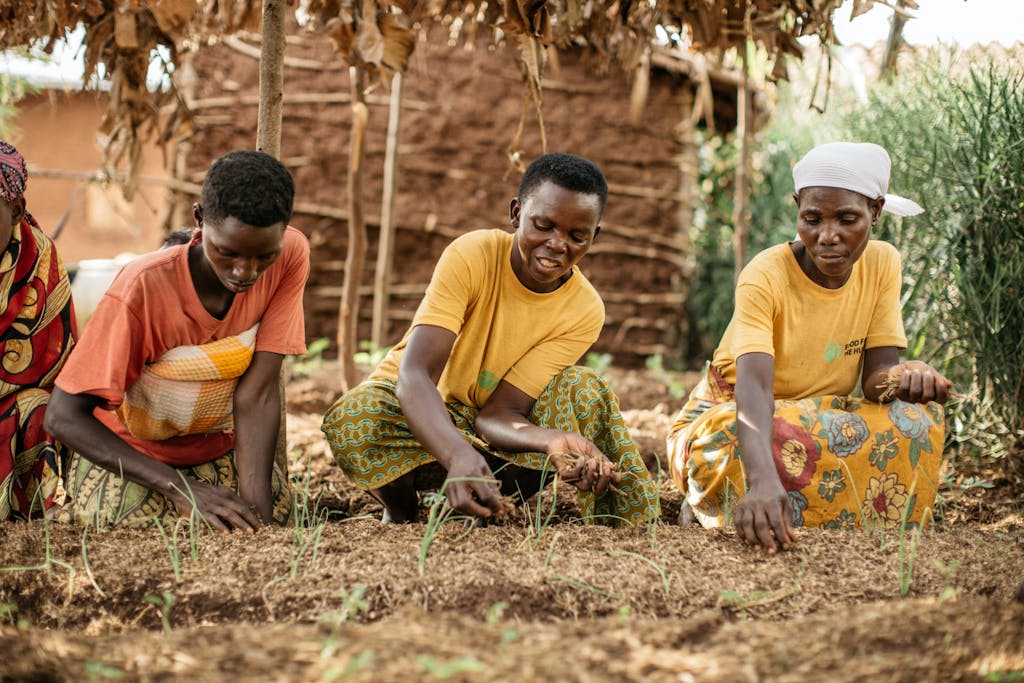Every year, International Women’s Day celebrates the achievements of women around the globe. In addition to honoring the world’s remarkable women, the day reminds us that not all women are equipped to reach their God-given potential. At FH, that matters because our faith tells us that all people are important and valuable to God. We know that women are a vital part of successful families, communities, economies, and cultures. And we should find ways to empower women and girls.
A Day in the Life for Women Around the World
Today, we celebrate International Women’s Day with a photo essay showing the contributions that women make to their communities. As you review these images, think about how you can thank an influential woman in your life for how she serves those around her. Then, consider giving to FH’s work empowering women to go further and reach their God-given potential for the sake of themselves and those around them.

In the early mornings, women wake up before their families to collect water.
Sometimes they trek miles in the early morning and arrive home exhausted before even starting school. Water is essential. But according to UNICEF, globally, women spend a collective 200 million hours every day collecting water. That adds up to 8.3 million days or nearly 23,000 years! This is time that could be spent sleeping, studying, or doing any number of other tasks. The burden of collecting water usually falls to women and girls. And they miss out on other opportunities as a result.

Women are teachers, inspiring young girls to work hard and achieve big dreams someday.
41% of teachers in low-income countries are women. Studies show that having female teachers contributes to young girls’ learning and reduces the achievement gap between girls and boys. And it’s true that across the world, female teachers are modeling hard work, perseverance, integrity, and good character for their students…and inspiring young girls to reach for the stars!

Women are showing their sisters, mothers, daughters, and neighbors how to raise children in safe and healthy homes.
As FH walks alongside communities, one of our primary methods for spreading messages of hope, life, and healing is through groups made up of key community leaders. These leaders go out and share the same lessons about health and hygiene with their friends and family. Then others are equipped to do the same. It’s primarily women who sit in kitchens, on front porches, at backyard tables, and in community centers, telling each other what they have learned about how to care for their families well. And guess what? When a best friend or sister explains how she helped her baby grow healthy and strong, women listen. And children’s lives are saved.

Women are entrepreneurs learning creative ways to earn money to support themselves and their families.
Around the world, women run businesses selling jewelry, tailoring clothing, and selling food. We know that when women work, economies grow and that when women have employment and leadership opportunities, businesses become grow faster and become more effective. Sadly, women are often excluded from labor markets by law or practice, and globally, women are paid less than men. Since we know that increasing the income earned by women has a direct impact on the wellbeing of children and improves economies overall, supporting female entrepreneurs is a key part of ending poverty.
Women are cooking healthy meals on a budget.
Even in times of food scarcity, women are innovative. We see them find creative ways to feed their families and work with what they’ve got. And when women are equipped with tools, resources, and knowledge, we see them growing vegetables in home gardens and raising chickens to supplement the food they buy at the markets. Women are innovative. That is why FH focuses on helping women grow, buy, and cook the best food for their families. And their children thrive as a result!

Women are tucking their little ones into bed and then staying up late to finish household chores.
In the 1980s, sociologist Arlie Russell Hochschild popularized the term “the second shift.” The second shift describes how, despite the fact that many women work long, hard days, they often carry the brunt of responsibilities at home — shouldering more of the childcare, cooking, and cleaning. Nights end not when the children go to sleep. But when mom finished the housework. Without this unpaid labor, homes and communities would not stay afloat.

Women are leaders in their homes and communities.
And supporting women to have equal access to good work, sustainable livelihoods, and necessary resources has a ripple effect…benefiting all of the children and people around them. Empowering women is a key part of achieving a brighter future and an end to poverty.

Equal and Enabled
This year, the theme for International Women’s Day is “An equal world is an enabled world.” If we want little girls to grow up to do great things, we need to equip them to do so.
One of the ways you can do that is by sponsoring a girl in poverty. When you sponsor a young girl, you give her access to education, food, clean water, health care, and the opportunity to have hope for the future.
In honor of International Women’s Day, will you sponsor a girl in poverty today?
More articles you may be interested in:
Photo Essay: International Women’s Day Around the Globe
8 Ways to Honor Women on International Women’s Day
7 Ways You Can Empower Girls on International Day of the Girl



